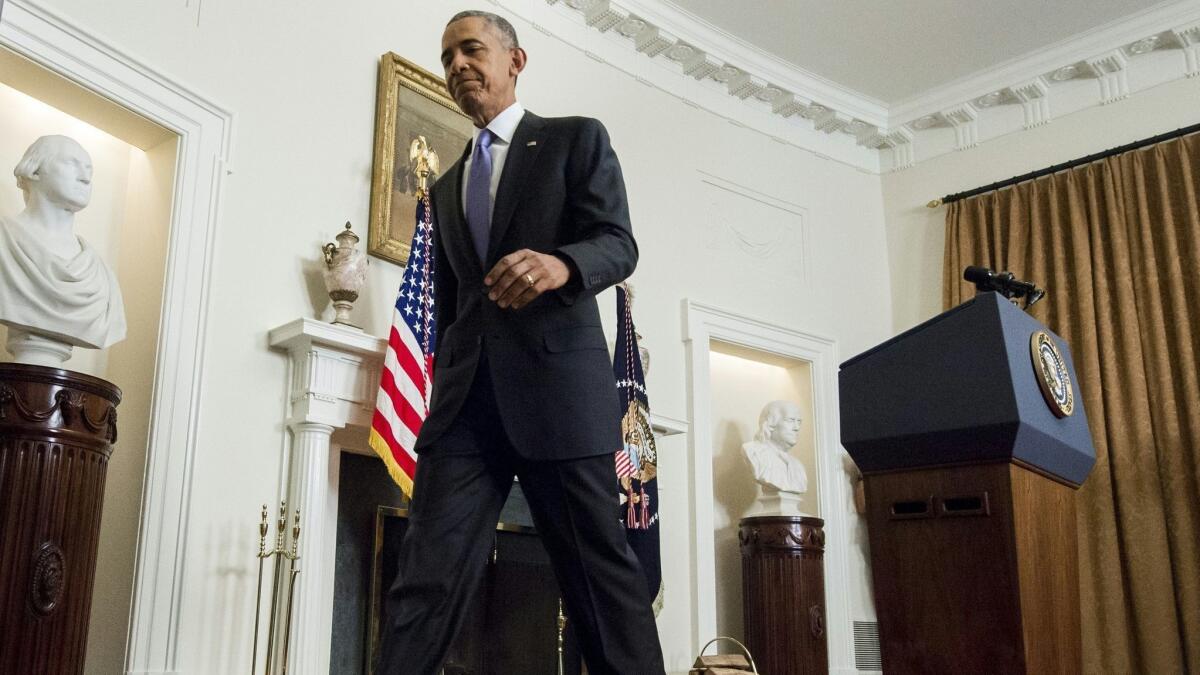Op-Ed: Great political speechmaking isn’t dead, it’s just waiting for a new voice

- Share via
It is easy to despair of politics — witness the actions of President Trump and the gallery of narrow-minded populists taking power across the globe. In particular, political rhetoric, in these leaders’ hands, is in the dock, accused of fakery, falsity and spin. But political speech can sing, and when it does, it moves the world in the right direction.
President Obama famously did sing. At the memorial service for the Rev. Clementa Pinckney, shot in Charleston, S.C., in July 2015, Obama paused in his remarks and began a brief rendition of “Amazing Grace.” I was a chief speechwriter to Britain’s former prime minister Tony Blair, and I have wondered how Obama and his staff worked that out. I imagine the president going through the script and saying, “Then I intend to sing.” Everyone would have looked at one another until someone said, “You are going to do what?”
And yet it worked, beautifully.
Great speakers — great political speakers — find an idiom of their own. Lincoln was hardly charismatic, but “government of the people, by the people, for the people” dazzles us. Franklin was so unwell at the Constitutional Convention in 1787 that he asked a friend to finish off the speech in which he endorsed “this Constitution, with all its faults.” Kennedy’s voice was rather thin, but his request that his fellow Americans ask not what their country could do for them has given him immortality in the pantheon of political speech.
The most intriguing contemporary case study is, of course, President Trump. It is common to criticize the president for the looseness of his rhetoric, but the truth is, whether you like his politics or not, Trump displays two of the virtues that any successful speaker must have.
The first is character. Like Elizabeth I addressing her troops as the Spanish Armada gathered, good speakers are confident in their role in the drama. Elizabeth personified the nation and spoke directly to its fears: “I know I have the body but of a weak and feeble woman, but I have the heart and stomach of a king, and of a king of England… Should [any] dare to invade the borders of my realm…I myself will take up arms.”
Trump at least has a presence that is confidently and decisively his own. The fact that he can be easily mocked is a strange kind of compliment. His mannerisms and style are instantly recognizable. Speechwriters call it “authenticity” and cultivate it in their clients.
Political speech can sing, and when it does, it moves the world.
The second virtue is clarity. We know what the president is saying. Aristotle called this the “seat of the argument”; Cicero called it “the Topic.” Rhetoric fails when it does not get to the point. In all Trump’s campaign and campaign-style speeches (and in his rallies since), he has been forensic in his focus on his audience. Trump speaks their language and he promises them deliverance. He inspires them.
That too is crucial for great political rhetoric: Define an injustice and answer it. The Rev. Martin Luther King Jr. inspired millions with his “I Have a Dream” speech at the March on Washington in 1963. Winston Churchill mobilized the English language to defeat Hitler in World War II. Nelson Mandela, on trial for his life, defended the right of all men and women to equal citizenship.
But inspiration is not sufficient, and here Trump should take a lesson from King. The little-known early parts of King’s famous speech were all about the need for the nation to unite. And in that, King was following a well-established pattern among American leaders.
In the brutal election of 1800, Thomas Jefferson had accused his opponent, John Adams, of being pro-English, and Adams countered by revealing that Jefferson had fathered a child with one of his slaves. Yet when Jefferson took office in March 1801, he ended the verbal warfare: “Let us, then, fellow-citizens, unite with one heart and one mind.”
Jefferson used a phrase that would be echoed by presidents many times since: “We have called by different names brethren of the same principle. We are all Republicans, we are all Federalists.” (“There’s not a liberal America and a conservative America,” said then-Sen. Obama in 2004. “There’s the United States of America.” )
Justice, inspiration, unity: That is political rhetoric at its best. Trump may never shine as a public speaker in categories other than character or clarity, but there is no need to despair for speechmaking. Oratory that meets the highest criteria is still possible. It only requires a leader to show some amazing grace.
Philip Collins is a columnist for The Times of London. His latest book is “When They Go Low, We Go High: Speeches that Shape the World and Why We Need Them.”
Follow the Opinion section on Twitter @latimesopinion and Facebook
More to Read
A cure for the common opinion
Get thought-provoking perspectives with our weekly newsletter.
You may occasionally receive promotional content from the Los Angeles Times.









